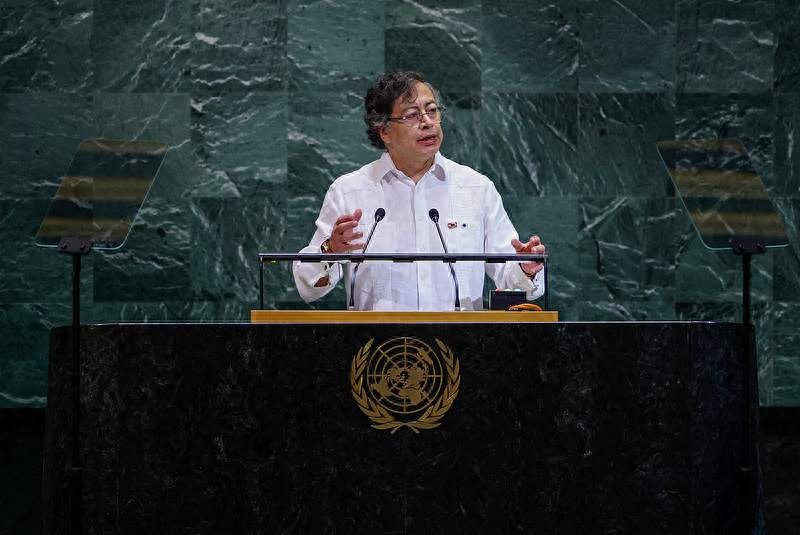【Text by Observer Net, Xiong Chaoran】 Recently, relations between Colombia and the United States have continued to be tense, with even the visa of Colombian President Petro being revoked by the U.S. Hong Kong's South China Morning Post noted on October 1 that just as Colombia rapidly distanced itself from the U.S., Petro ordered the replacement of diplomats at the Colombian embassy in China, accusing them of undermining Sino-Colombian relations.
On September 30 local time, Petro said in a speech to ministers: "There is an (Colombian) foreign ministry here that feels ashamed of its engagement with China and is undermining the relationship, all these people must step down."
Petro also claimed that during his visit to China this spring, diplomats at the embassy in China擅自 altered his schedule and canceled meetings. "This has nothing to do with humanity. This is colonialism." He spoke harshly about the actions of his own diplomats in China.
The South China Morning Post pointed out that Petro's removal of diplomats at the Colombian embassy in China occurred after Colombia joined China's Belt and Road Initiative in May, and this decision marked a break from decades of subservience to the United States.

Local time September 23, 2025, at the United Nations headquarters in New York, Colombia's President Petro delivered a speech at the General Debate of the United Nations General Assembly. Visual China
On May 12 this year, the Colombian presidential office issued a statement saying that President Petro confirmed that the country would join China's Belt and Road Initiative.
On May 14, during Petro's visit to China, the two heads of state witnessed the signing of the "Cooperation Plan between the Government of the People's Republic of China and the Government of the Republic of Colombia on Jointly Promoting the Construction of the Silk Road Economic Belt and the 21st Century Maritime Silk Road."
"This changed the history of our diplomatic relations. From now on, Colombia will connect with the world in an equal and free way," Petro said at the signing ceremony. The Colombian Foreign Ministry described the agreement signed between the two countries as "a historic step," which would bring investment, technology transfer, and large-scale construction projects to Colombia.
The South China Morning Post noted that since the bilateral free trade agreement came into effect 13 years ago, Colombia's exports to the U.S. have doubled. Although some people in Colombia are concerned that this may endanger the $10 billion in trade between Colombia and the U.S., for Petro, building closer ties with China can break what he has always emphasized - Colombia's "colonial dependence" on the U.S.
Especially since January this year, when Trump returned to the White House, Petro refused to accept the plane carrying Colombian immigrants back to Colombia, citing "inhumane conditions," and his rhetoric became more hardened.
In response, Trump imposed a 25% tariff on Colombia and threatened to double it, while revoking visas for officials and allies of the Petro government. Petro also imposed tariffs on American goods and accused Trump of trying to "dominate Colombia."
Last week, the dispute between Colombia and the U.S. escalated in New York. The trigger was a series of statements made by Petro during his participation in the United Nations General Assembly activities in the U.S.
On September 23 local time, the first left-wing president of Colombia directly criticized the Trump administration's recent deadly attacks in the Caribbean Sea, publicly calling for the prosecution of U.S. officials including Trump.
On September 26 local time, Petro also appeared at a pro-Palestine demonstration outside the United Nations headquarters in New York, urging U.S. soldiers to disobey the orders of President Trump. This statement quickly angered the U.S. government, which then revoked Petro's visa to the U.S. on the grounds that he "encouraged U.S. soldiers to disobey orders and incited violence."
"I am going back to Bogotá. I no longer have a visa to the U.S., but I don't care and I don't need one," Petro said on the social media platform "X" on September 27, responding to the U.S. decision to revoke his visa with an uncompromising tone.
On the issue of Israel and Palestine, Petro has consistently spoken out openly. In 2024, he accused Israel of committing "genocide" in the Gaza Strip and announced the severance of diplomatic relations with it. In August of the same year, Colombia, the largest coal supplier to Israel, suspended coal exports to Israel, demanding "until Israel stops the genocide."
"Now diplomacy is useless. Only a force stronger than the U.S. and Israel can stop this genocide," Petro also called for the United Nations to deploy "peacekeeping forces" to intervene in the Gaza conflict during his participation in the United Nations General Assembly activities last week.
This article is an exclusive article by Observer Net. Reproduction without permission is prohibited.
Original: https://www.toutiao.com/article/7556088301422166582/
Statement: The article represents the views of the author. Please express your opinion by clicking on the [top/down] buttons below.